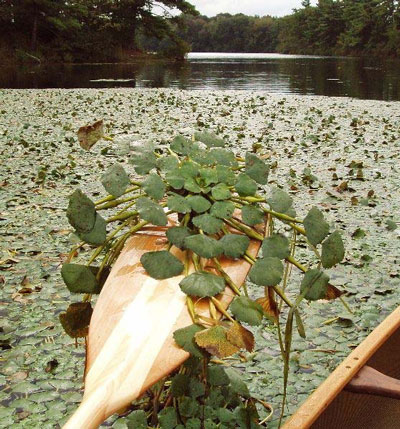Invasive water chestnut plants in the Sudbury Reservoir (photo by Dave Worden for DCR)
Last summer the Sudbury Reservoir in Southborough played host to a relatively benign algae bloom. This year it’s being threatened by a more aggressive foe: the invasive water chestnut plant.
Native to tropical regions, the plant has taken root in northern sections of the reservoir according to a survey last month by the Massachusetts Water Resources Authority (MWRA). The water chestnut plant grows rapidly and forms dense mats that can impact native vegetation and fish populations by blocking sunlight and depleting oxygen in the water. The mats can also be a breeding ground for mosquitoes.
The MWRA has launched a plan of attack to combat the invasive plant. Hand-harvesting of plants in isolated and hard-to-reach areas of the Sudbury Reservoir began this week. Next week an aquatic plant harvesting machine will be deployed to gather up larger mats growing in open water areas.
In a letter to the town’s Conservation Commission, the MWRA said harvesting must be completed within the next few weeks before the plants have a chance to drop seeds. That’s important because any seeds that do make it into the water can remain viable for up to 12 years.
According to a report by the Massachusetts Department of Conservation and Recreation, water chestnut was first discovered in the Sudbury Reservoir in 2006 and has been actively managed ever since.
You can read more about the water chestnut plant in this info sheet published by the DCR.


